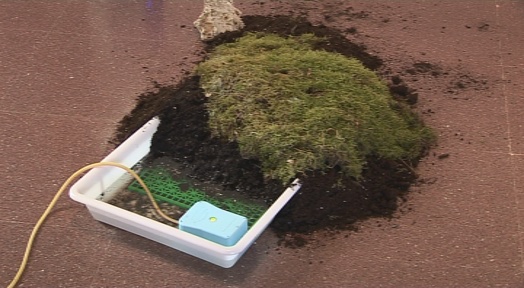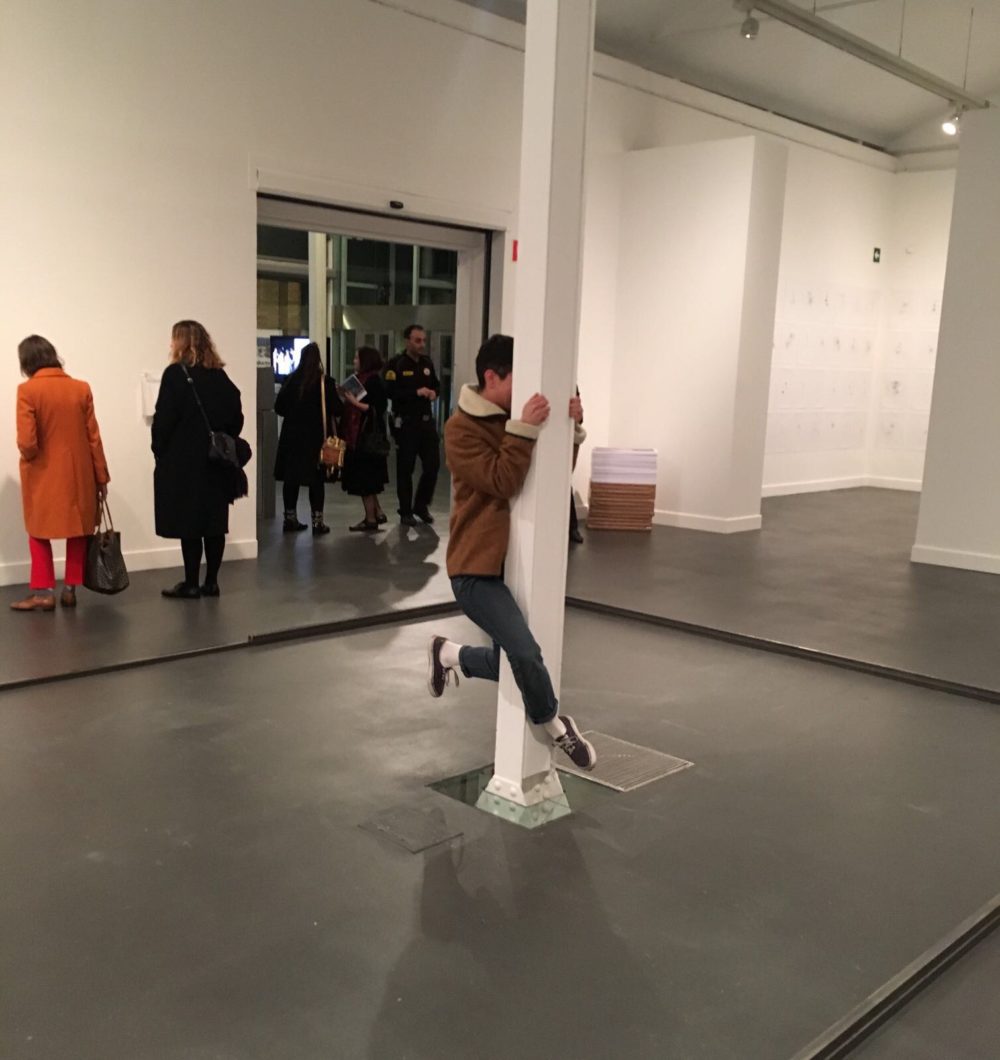Search
To search for an exact match, type the word or phrase you want in quotation marks.
A*DESK has been offering since 2002 contents about criticism and contemporary art. A*DESK has become consolidated thanks to all those who have believed in the project, all those who have followed us, debating, participating and collaborating. Many people have collaborated with A*DESK, and continue to do so. Their efforts, knowledge and belief in the project are what make it grow internationally. At A*DESK we have also generated work for over one hundred professionals in culture, from small collaborations with reviews and classes, to more prolonged and intense collaborations.
At A*DESK we believe in the need for free and universal access to culture and knowledge. We want to carry on being independent, remaining open to more ideas and opinions. If you believe in A*DESK, we need your backing to be able to continue. You can now participate in the project by supporting it. You can choose how much you want to contribute to the project.
You can decide how much you want to bring to the project.

In Strata by Ariadna Guiteras an ancestral Voice through history is enveloped in ‘a romantic story of polyamory in the Anthrobscene’. Jussi Parikka uses this term to refer to the mirage of a false promise of a redeeming technology that makes our relationship with the environment healthier. The polyamory relationship we have with our devices, and our devices have with each other thanks to an extensive network of material relations, is toxic. The Cloud perforates the Earth. We live in the Third Carbon Age. The plastiglomerate that Strata’s Voice interacts with will be a fundamental part of our geological legacy. A spatial gauge that points to Earth. The media are the message. Software is matter. Archaeology of a residual environmental future. The rubbish container is a laboratory of the Plastisphere, whose forms of life perhaps also wonder, like Arthur Clarke, why this planet is called Earth when it is Ocean.
In the Anthrobscene, human beings are a geophysical force, together with the corporate desires that exploit our lives to benefit capital — capital that for more than a century has been the Capital, the mythological beast par excellence of our present. Ferocious, unpunished and omnipresent. Capable of making us believe that there is no possible alternative, not even in this stronghold of freedom that could be the imagination. Such is its strength that it has given name to the Capitalocene, a more controversial term with less adherents than its older brother the Anthropocene. The Capitalocene is of Marxist descent, an upshot of modernity in a present that tends to believe that it is possible to bury the past. The spell of progress continues to dominate our lives and our understanding of the world. It used to steer us towards a victory without an adversary; now it steered us towards failure, total disaster. We ourselves are the enemy. But we have awarded ourselves the decoration. We are the great geological force of the planet.
Science fiction, which we have often praised for its looking to the future, has given us many apocalypses that continue to place man – not human beings – at the heart of their supposedly alternative ideologies. The story is teleological. And hetero-patriarchal. As in all things, there are necessary exceptions. The Female Man, by Joanna Russ, doesn’t have any imminent or latent possibility of a tragic end for humanity. It imagines the unimaginable and dispenses with the leading actor who dominates the equation between word and future and, without violence, breaks the symbiosis between extractivism and technology. The Female Man light-heartedly removes men from the future, exchanging the post-apocalyptic desert for the calmness of a scientifically advanced world in which women voluntarily choose to build an agrarian society over the course of centuries. Today, Russ’s rural utopia becomes real through desire and the recommendations of those who have understood that cities aren’t the natural result of history – nothing is – but of an unconscious ideological choice. Perhaps in order to think of the future we need more social fiction and less science fiction. Perhaps, in order for this future to exist, we need to begin to stop thinking that it includes the answers. Or we do.
Most science-fiction stories are steered towards the same end: the end of history. A story that is only one of many possible stories. A story that is foreign to the life (and the non-life) of many other entities and yet has ended up appropriating them, usurping their right to a story of their own that will not compromise their survival. The end of history is a presumably involuntary objective that is also rooted in the teleological account shared by the Capitalocene and the Anthropocene. The theme isn’t even new, as it was born at the beginning of history and will conclude when history really does come to an end. The Anthropocene has made us more aware of the transformative effects of human activity on the planet than the Holocene, yet as a category it is as dramatic as all those ends of the world it predicts. Due to its etymological legacy, this ideological term doesn’t even include us all. The anthropos is partial. It is the universal man, white and Western. The one who invented the steam locomotive or explosives. The same one who conceived the importance of coal, oil or lithium in the world economy. The Anthropocene is Eurocentric. In its historical distribution of blame it accuses the Industrial Revolution, a really small event that eclipses all other worldly relations that intervene in the transformation of the planet. The Anthropocene is arrogant and anthropocentric. It continues to place the human being at the centre of forces of a decentralised action. The Anthropocene is a fiction, a myth – auto-poiesis. To quote Haraway, who I mention now but who is present throughout the text, ‘It is hard to tell a good story with such a bad actor. Bad actors need a story, but not the whole story.
The Anthropocene is neo-liberal. Its social apparatus is heavy and painfully bureaucratic in its search for solutions that are only valid if they continue to benefit capital. Renewable energies simply renew the contents and strategies of neo-liberalism. They exchange resources and needs within the same paradigm of dominating the environment. Bureaucracy, set within the genetic code of neo-liberalism, is something that Mark Fisher managed to dissociate from communism, as worthy as the first category of the Extractivocene, the least successful of all this onomastic elite that tries to encompass interactions that we cannot contain. The Anthropocene is class-conscious. As a term, it has been naturalised by the intelligentsia of the wealthier and more privileged areas of Western society, but is not that useful for analysing other societies and other forms of interaction and relation, human and non-human. The Anthropocene is a post-human state of emergency that appears when we can no longer continue to live in history. The Anthropocene is of no use to us, neither is the Capitalocene. The problem here isn’t the terminology but the material effects produced and reproduced by discourses. And then what?
Haraway opens up the possibility of thinking from an unfinished story in which the subversive leads to a more modest position. The Chthulucene. A story in which we are simply another element in a mesh of relations and entities in continuous transformation. We are all compost. A story with different mythological forms. They are earthly. Perseus as the Medusa’s ally. Medusa as humanity’s ally. Athena was never an orphan. Gaia as a name that contains many other names. Goddesses with mutant bodies and a sensory dimension. A body of bodies. A system of systems. Hives, corals, lichen. Lynn Margulis: the genome as a register of the activity of organisms. The homo metamorphosed into humus. The earth as a complex system that is adaptive and capable of absorbing blows to transform into a viscous space, not an arid wasteland. But even deserts are full of life. Kinship relations that are not determined by consanguinity. Tentacular, not testicular. A macro-micro polyamorous story without the toxicity of romanticism. A transformative and not catastrophic time. Interaction becomes intra-action. Feminism as a channel for another ethical positioning that has managed to dissociate from anthropocentrism. The impersonal is political. The Chthulucene as the world in which dying well is as important as living well. In present continuous and not in future.
(1) Donna Haraway, Staying with the Trouble: Making Kin in the Chthulucene, chapter 2, ‘Tentacular Thinking: Anthropocene, Capitalocene, Chthulucene’, Duke University Press, North Carolina, 2016

artwriter_curator_esnorquelmaker_chocolateresearcher_technodancer__bikeenthusiast_coffeeaddicted_
"A desk is a dangerous place from which to watch the world" (John Le Carré)